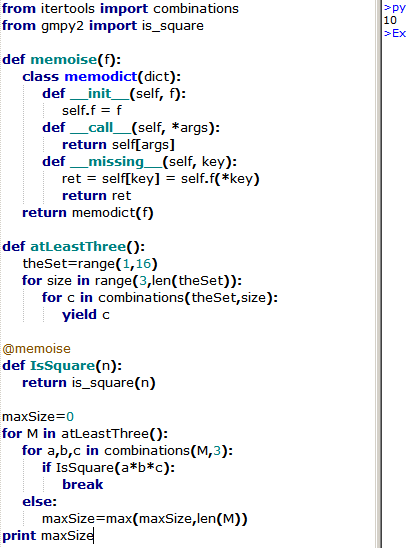Maximum number of elements
Let be a subset of such that the product of any three distinct elements of is not a square.Determine the maximum number of elements in .
The answer is 10.
This section requires Javascript.
You are seeing this because something didn't load right. We suggest you, (a) try
refreshing the page, (b) enabling javascript if it is disabled on your browser and,
finally, (c)
loading the
non-javascript version of this page
. We're sorry about the hassle.

Note that the product of the three elements in each of the sets { 1 , 4 , 9 } , { 2 , 6 , 1 2 } , { 3 , 5 , 1 5 } and { 7 , 8 , 1 4 } is a square.Hence none of these sets is a subset of M . Because they are disjoint, it follows that M has at most 1 5 − 4 = 1 1 elements. Since 10 is not an element of these sets, if 1 0 ∈ / M ,then M have atmost 1 0 elements.
Suppose 1 0 ∈ M .Then none of { 2 , 5 } , { 6 , 1 5 } , { 1 , 4 , 9 } , and { 7 , 8 , 1 4 } is a subset of M . If { 3 , 1 2 } ⊂ M , it follows again that M has at most 1 0 elements.
If { 3 , 1 2 } ⊂ M , then none of { 1 } , { 4 } , { 9 } , { 2 , 6 } , { 5 , 1 5 } , and { 7 , 8 , 1 4 } is a subset of M , and then M has at most 9 elements. We conclude that M has at most 1 0 elements in any case. Finally, it is easy to verify that the subset M = { 1 , 4 , 5 , 6 , 7 , 1 0 , 1 1 , 1 2 , 1 3 , 1 4 } has the desired property. Hence the maximum number of elements in M is 1 0 .